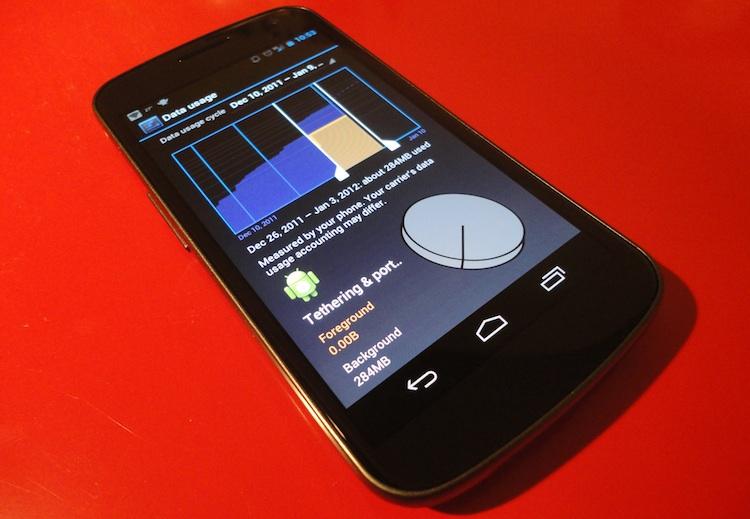
Over the past two years, a topic that has garnered quite a bit of attention is tethering. Using a smartphone's existing wireless connection to connect a PC to the Internet is nothing particularly new. In fact, it has been going on since before the RAZR days – you just couldn't expect blazing speeds of any sort.
But since smartphones now have always-on connections, are open to much faster, more capable wireless networks and said wireless networks are now under a lot more stress (read: millions of data-hungry smartphone users), tethering has become a point of interest for wireless providers. For many carriers, tethering is a premium add-on service. A customer must pay an additional $15 to $30 that typically adds to an existing data allotment and unlocks proprietary software that allows the user to either share the connection via USB or a wireless hotspot. After this, the customer is free to use their data however they please, paying for overages as necessary, of course.
Before, carriers were really only concerned with heavy data users hogging all of the bandwidth and making the rest of the users in the surrounding area suffer from horridly slow speeds. But the real trouble with tethering came into the limelight once carriers started moving away from unlimited data plans.
People who were already on an unlimited data plan were grandfathered into said plans and were allowed to continue using their data for the foreseeable future without the worry of overages. Now on AT&T, Verizon and T-Mobile, once you reach your data cap, you are either hit with an overage fee – which simply adds another gigabyte (sometimes less) of data to your allotment – or your data is throttled to 3G or 2G speeds. So, the problem was that people with those grandfathered, unlimited data plans were using unauthorized means of tethering and using ungodly amounts of data. It wasn't fair to the people who paid an additional fee every month to tether (the official way) or those who weren't on unlimited plans who were limited to a maximum of just a few gigabytes of usage before getting slammed with overages.
So what did the carriers do? They threatened automatically remove the unlimited plans from guilty customers' accounts, replace them with a comparable tier and add the tethering fee to their accounts. They also started blocking unauthorized tethering applications in Android Market and made it that much more difficult for users who wanted to circumvent the system. (It hasn't stopped new tethering methods from entering the scene, though. Koushik Dutta just released a free tethering method that works without root, called ClockworkMod Tether.)
Personally, this is something that just never sat well with me. I just doesn't make sense. I understand the need to charge people extra if they're abusing or overusing a service. (That's what overage charges are for, right?) But for those who are simply using their computer to browse the Internet a little more comfortably or when in a bind, it doesn't make sense to charge them $15 to $30 extra just to use the service within reason, or conservatively, even. What makes less sense is how they charge people tethering fees when they're using a device such as the Motorola Laptop Dock for the Atrix 4G, which isn't a standalone device and thereby isn't even "tethering" by definition.
It's all very shady and cloudy, if you ask me. Bits are bits, we're going to use them one way or another. If we pay for our data consumption, why should any carrier care how we use it? People who tether a lot are going to eat through their data allotments pretty quickly (I tethered for three hours the other night and used nearly one fourth of my 2GB limit) anyway. The point being, carriers are going to make their money regardless. Charging extra to "allow" tethering is just plain greedy.
To be honest, I've only used tethering a couple times over the span of three years. I never tethered with my slew of BlackBerrys, and I remember testing it out a time or two when I bought my first Android phone and hacked it seven ways to Sunday. I also remember having scored a free hotspot package when I bought a Pre Plus on Verizon. Even then, I only used the Pre Plus to tether once when my Internet went down as I was emailing a project to my teacher three minutes before it was past due. (Hooray for procrastination!)
I tether more now than I ever have before and to date I can still only recall tethering a total of eight or nine times ... ever. I will probably rely on it over the next few days as I am moving tomorrow and don't have Internet at my new place yet. But in truth, I will probably scout the area for coffee shops with free Wi-Fi before resorting to using my phone to tether. It has always been a last resort that I use very sparingly. And it likely always will be as long as it's a paid service.
The real question is, how many of you actually use tethering? Do you actually pay for it? Are any of you running the risk of losing your unlimited data plans for tethering by unauthorized methods? Let us know by taking the poll below!